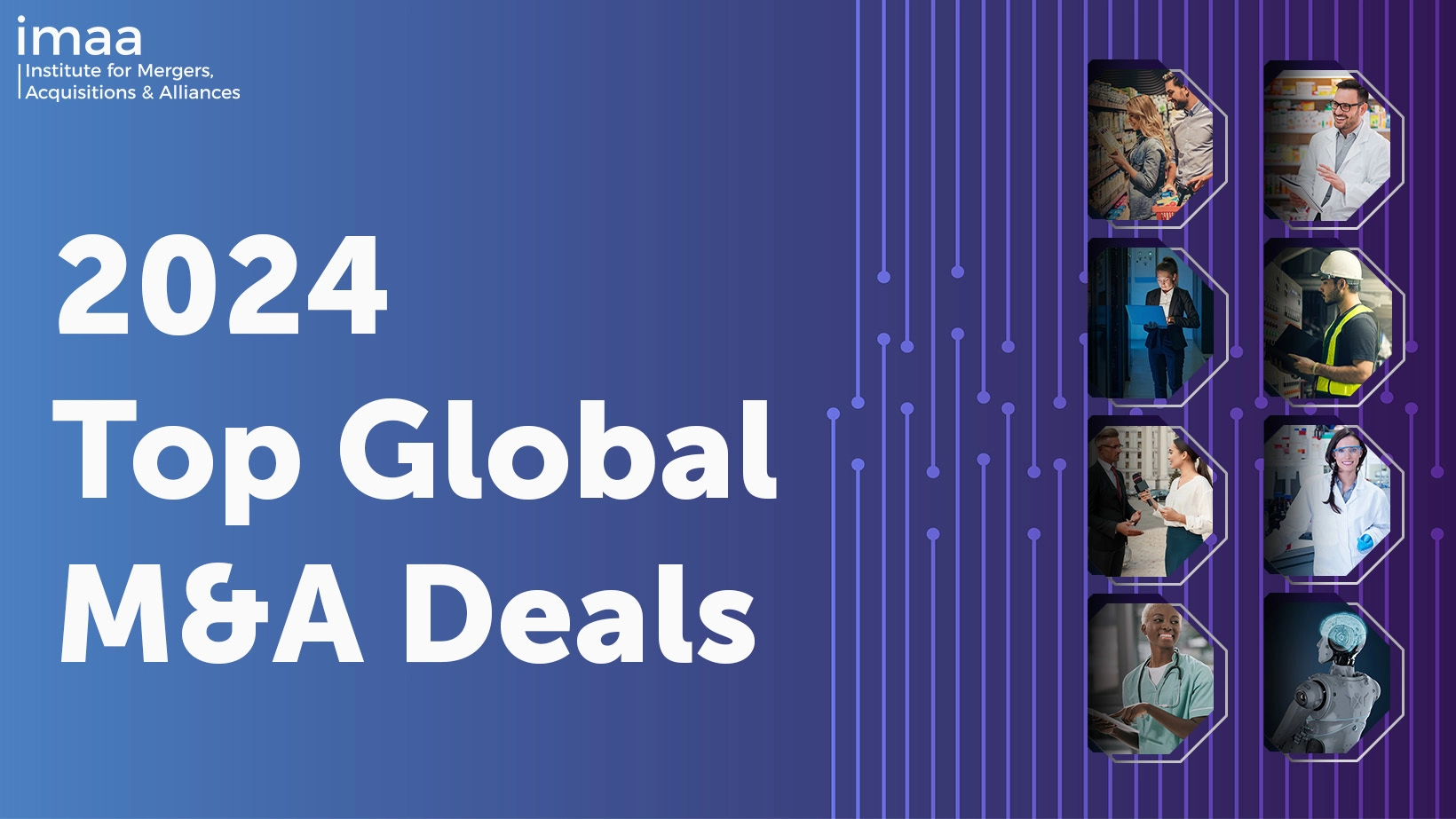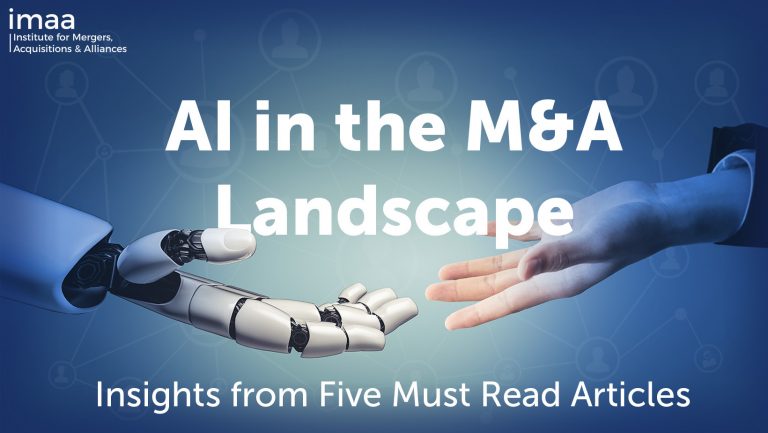
Blog AI in the M&A Landscape: Insights from Five Must Read Articles
- Blog
AI in the M&A Landscape: Insights from Five Must Read Articles
- Pia Jarantilla

SHARE:
The world of Mergers and Acquisitions (M&A) is rapidly changing thanks to Artificial Intelligence (AI). Gone are the days of solely relying on gut feelings and old data tools. Today, AI offers novel perspectives, efficiency, and precision to the M&A process. From due diligence to post-merger integrations, AI is redefining how decisions are made and how businesses evolve.
In this compilation, we delve into five insightful articles that capture the essence of this transformation, offering a glimpse of the present and future of M&A in the age of AI.
Article 1:
Not using analytics in M&A? You may be falling behind
To start our journey, let’s first understand the broader transformation AI and analytics are triggering in M&A. In this article from Deloitte, Rishi Malkani writes how data analytics and AI are revolutionizing the M&A process, enabling deeper insights and faster decisions throughout the deal lifecycle.
The M&A landscape is being transformed by data analytics and AI by enabling more informed and faster decision making throughout the M&A process. Traditional spreadsheet-based analyses are being superseded by dynamic analytical tools that offer comprehensive insights with increased precision.
During due diligence, these tools delve into transaction-level data to derive a clearer understanding of a target company’s growth sources, customer retention, and margins evolution. In negotiations, analytics assist in decision-making regarding offers, risk assessment, and bidding strategies. During post-merger integrations, they help in identifying synergy opportunities, tracking progress, and monitoring changes in customer sentiments and risk profiles.
Deloitte’s iDeal platform employs AI for efficient data organization, tagging, and report generation, emphasizing the increasing value of “smart automation.” As AI’s role in M&A grows, businesses are encouraged to embrace these technologies, breaking away from traditional methods to gain a competitive edge in deal-making.
Not using analytics in M&A? You may be falling behind
Read full article hereArticle 2:
Unlocking the Potential of AI for M&A: The Future of Dealmaking
Diving deeper into the AI-driven evolution in M&A, this article from Medium, contributed by Pro Business Plans, also discusses how AI is reshaping M&A by enhancing due diligence, aiding post-merger integration, and necessitating a balance between automation and human expertise in legal contexts.
AI’s capacity to revolutionize due diligence is evident, with its profound ability to efficiently sift through data and enhance risk evaluations, expediting deals and revealing hidden avenues of opportunity. However, with such technological advancements, the role of legal professionals becomes increasingly indispensable. They are tasked with interpreting the vast swaths of AI-produced insights and ensuring an equilibrium between the efficiency of automation and the nuances of human judgment. This balance becomes even more essential during post-merger integrations, where AI’s analytical capabilities are leveraged to assess vast financial data, making integration smoother and more strategic.
As AI continues to redefine M&A, it’s imperative for stakeholders to adeptly navigate its offerings to ensure that transactions are not only seamless but also insightful and rewarding.
Unlocking the Potential of AI for M&A: The Future of Dealmaking
Read full article hereArticle 3:
How AI for M&A due diligence is changing every aspect of the deal process
Building on the broader impacts of AI, it’s crucial to zoom into one of the most crucial stages of M&A: due diligence. In this article from Thomson Reuters, Chris O’Leary and Raees Nakuhuda offers an in-depth look at how AI is revolutionizing this historically labor-intensive process.
In the M&A world, due diligence has historically been a labor-intensive, error-prone process, often met with tight deadlines and the pressure of high stakes. However, the integration of AI, particularly through tools like Document Intelligence, is revolutionizing this landscape.
AI streamlines document reviews by rapidly analyzing, categorizing, and extracting pertinent information, even from extensive data sets, sometimes reducing the review time by up to 70%. This AI-driven approach not only expedites the process but ensures greater accuracy, consistency, and depth in document analysis. As a result, law firms can offer faster, more efficient, and cost-effective services, attracting more business and allowing legal professionals to provide value-added, strategic advice to their clients.
Despite automating many tasks, AI enhances rather than replaces the role of lawyers, affording them new opportunities to harness comprehensive data for expert advisory roles.
How AI for M&A due diligence is changing every aspect of the deal process
Read full article hereArticle 4:
FOMO-Driven Generative AI Acquisition Spree Has Begun
As we’ve seen the operational benefits of AI in M&A, it’s equally important to gauge its strategic significance in the broader business world. In this article from Forbes, Sanjit Singh Dang sheds light on how generative AI has spurred a surge in corporate mergers and acquisitions, driven by its transformative potential in innovation and business efficiency.
Generative AI has been a catalyst for a surge in mergers and acquisitions (M&A) among mid-sized and large corporations, driven by its potential to revolutionize innovation and efficiency in business. Following the global attention drawn by ChatGPT’s release in November 2022, there has been an underlying anxiety among established enterprises about maintaining their relevance in this evolving AI landscape.
The transformative abilities of Generative AI – from spurring innovation and automating routine tasks to offering personalized customer interactions and deep data analysis – have become central to corporate strategic planning. This trend is evident in high-profile acquisitions like MosaicML’s purchase by Databricks at $1.3 billion and Casetext’s acquisition by Thomson Reuters for $650 million.
The article further touches upon potential future acquisitions by tech juggernauts such as Google, Meta, Microsoft, and Apple, signaling the integral role of AI in shaping the future of corporate decision-making. As businesses progress into this AI-driven era, it’s evident that the M&A wave powered by Generative AI is setting a new direction for the global corporate landscape.
FOMO-Driven Generative AI Acquisition Spree Has Begun
Read full article hereArticle 5:
AI boom forces tech companies to make M&A choice
Concluding our exploration, in this article from Financial Times, Richard Waters offers a perspective on the pivotal decisions tech giants face in the wake of the AI boom. The choices companies make today – whether to acquire, partner, or develop in-house – could shape the industry’s landscape for years to come.
The rapid growth in generative artificial intelligence (AI) is prompting tech companies to decide whether to build their own capabilities, partner with AI firms, or acquire them outright. Recent significant moves include Databricks’ $1.3 billion acquisition of MosaicML, a generative AI start-up, and Thomson Reuters’ $650 million purchase of Casetext, an AI company specializing in legal services that recently ventured into generative AI.
While acquisitions spotlight the burgeoning opportunities in generative AI, many tech giants are focusing on forming partnerships often backed by equity investments, as evidenced by Salesforce’s and Oracle’s recent investments in AI startups. However, the strategic relationship between Microsoft and OpenAI, highlighted by Microsoft’s investment exceeding $10 billion, poses questions about long-term dependence and potential competition.
AI boom forces tech companies to make M&A choice
Read full article hereClosing Insights: The Transformative Impact of AI in M&A
Artificial Intelligence (AI) is reshaping the M&A landscape in profound ways, from streamlining due diligence to enhancing post-merger strategies. As these articles highlight, AI’s integration offers more than just efficiency; it provides a roadmap for informed decision-making and strategic growth.
However, the true potential of AI in M&A isn’t about sidelining the human touch, but rather in harmoniously blending it with these advancements. The balance between AI’s precision and human intuition remains critical. For industry professionals and businesses engaged in M&A, recognizing and harnessing the combined strength of human expertise and AI isn’t merely an advantage—it’s a prerequisite for thriving in an increasingly dynamic marketplace.
As we look to the future, the seamless melding of AI’s capabilities with human insight will set new standards, propelling the M&A field to unprecedented heights and successes
Interested in more insights on AI and M&A? Explore the role of AI in the future of mergers and acquisitions and the top global M&A deals in the AI sector. These pieces offer a comprehensive look at how AI is reshaping the landscape of corporate mergers and acquisitions.
TAGS:


Stay up to date with M&A news!
Subscribe to our newsletter


